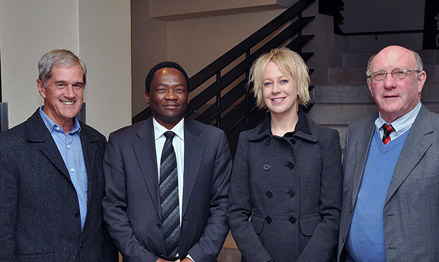|
 |
Some of the former SRC presidents who attended the inaugural dinner were, from the left: Roelf Meyer, Bloemfontein Campus 1970; Dr More Chakane, Qwaqwa Campus 1990; vice-chairperson of the AFSP; Dr Anchen Laubscher, first woman president of the Bloemfontein Campus 2003; and Prof Voet du Plessis, Bloemfontein Campus 1967/8.
Photo: Stephen Collett
19 August 2013 |
The University of the Free State (UFS) made history this weekend with the establishment of its Association of Former SRC Presidents (AFSP) – the first association of its kind after the merging and incorporation of public institutions in 2003–2004.
Twenty-two former SRC presidents attended the inaugural dinner to launch the association on Women's Day, Friday 9 August 2013, and recognised especially the attendance of all four female presidents that previously chaired the SRC. Other guests included former rectors and chairpersons of the UFS Council, as well as chairpersons of the Alumni.
The attending presidents served during the period 1967–2012, either at the former University of the Orange Free State (UOFS), the Qwaqwa Campus of the former University of the North, South Campus of the former Vista University and the University of the Free State.
“Your very personal narratives as former student leaders during the troubled past of our history in South Africa matter most as you design the questions for and purpose of an authentic conversation with student leaders today – this will set your association apart from others," said Rudi Buys, Dean of Student Affairs.
Former SRC president of 1975/6 and now founding member and chairperson of the association, Dr Michiel Strauss, said that this is the opportunity for former student leaders to give back to the younger generation.
“It is true that many middle-aged white South Africans have a deep sense of debt and obligation towards the youth of our country. We owe them an apology for the discrepancies of the past. This apology should be more than just words. Deeds of reconciliation and restitution must be seen.
“As for myself; I was president of the SRC of the then UOFS in the same period in which the biggest part of the youth of South Africa suffered so much in their struggle for freedom in our country.
“In my personal capacity, as well as in my official capacity as SRC president, I did nothing to try and understand and/or co-operate in the struggle of my peers. This fact haunts me until this day.
“The question then for people like me and so many others, is: Where do I invest my time and energy and passion for this country? Where will my contribution make a real difference? There is no better answer to this burning question than to invest in the human resources in our beloved South Africa, and more focused – to invest in the young people.
“There is something meaningful and beautiful happening at the UFS and it is now a leader in academic standards, reconciliation, leadership formation and nation building. I can think of no better place to make my small contribution,” Dr Strauss said.
“As former student leaders, we have a sense of purpose to contribute to the university and there is no better time to start than now. It is my privilege to be part of this great initiative and I look forward to what will be achieved,” said Dr More Chakane, deputy chairperson of AFSP and former SRC president of the Uniqwa Campus of the University of the North in 1990 (now the Qwaqwa Campus of the UFS).
Roelf Meyer, known for the prominent role he played in the negotiations to end apartheid in South Africa and chairperson of the Civil Society Initiative (CSI) of South Africa, said his time as a leader at the university has given him the opportunity to apply and use his skills and experience and share it with the new leaders of the institution. "The UFS is highly regarded because of the exceptional standards and excellence portrayed by its senior leadership. Where I can make a difference, I'll do it with pleasure and pride," he said. Meyer served as SRC president in 1970.
The association met on Saturday 10 August 2013 to adopt its interim constitution and consider operational matters, while also reaching agreement on its core functions in support of its purpose to transfer change leadership skills to incumbent student leaders and mediate meaningful contributions of Alumni to the growth of the university.
“We greatly value the declared intention of AFSP to work with the university to design meaningful and sustainable mentorship programmes to support and guide student leaders on campus, and have pledged our support in this regard,” said Buys.